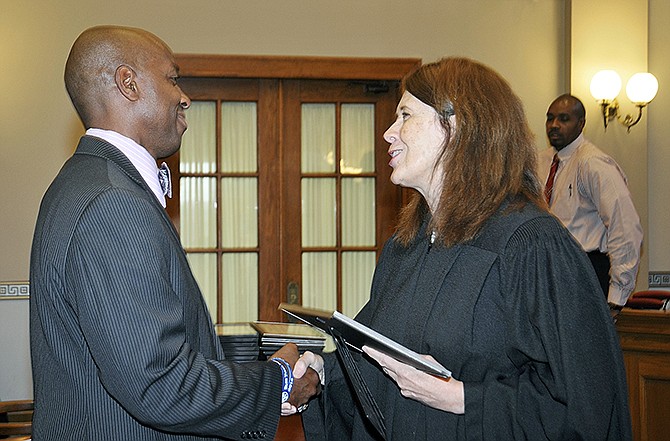Brenda Schell says drug courts help save lives.
The director of the Jefferson City-based Missouri Recovery Network, Schell was one of several people helping Cole County Circuit Judge Pat Joyce thank area businesses for their role in providing jobs to people going through the drug court program.
"Part of recovery is having a stable, self-respecting place to live, and having a purpose in your community - and having a job," Schell noted during the Wednesday ceremony at the end of regular drug court session.
"Dealing with Judge Joyce every day, and going through the program, really just did a profound thing on my well-being, on my life, the decisions that I make these days," recent graduate John told representatives of the 35 businesses honored.
"They really helped me out and I'm really proud to be an alumni of this group, and I spread the word to everybody that goes through the program, that it really changes your life."
Among those honored Wednesday was John's employer, Capitol Plaza Hotel.
Other businesses recognized included Cafe Via Roma, Pizza Hut, Central Bank, Lincoln University and Command Web.
Alexandria graduated from drug court last May.
"I spent 13 months in the program and, when I came in. I wasn't probably the easiest person to work with," she admitted. "I needed an attitude adjustment.
"But they were really patient in working with me, and allowing me to grow."
She said drug court helped her accomplish several "miracles" in her life, including going "from being homeless to having a home - I'd been homeless for years, so that was a pretty big deal for me."
She regained custody of a son after losing him for two years.
She now is married, with a stepson and a new baby daughter she described as "a "clean' baby."
"I was able to get my GED, which I never thought I'd be able to do," Alexandria said. "And I'm actually enrolled in a college, full-time, which I applied for while I was still in drug court."
She now works for an automobile dealership, and has received a couple of promotions.
Joyce reminded the participants and businesses that the drug court - designed to help some people avoid prison for drug-related crimes - is not an easy option.
"In the first phase, they come to court weekly to see me," she explained. "They go to their probation officer weekly.
"They go to treatment two times a week, with professional therapists - Pathways and Preferred have been our partners for years."
They do both group and individual therapy sessions - and they're subject to regular drug testing.
As they move through the program, drug court participants also are required to do community service.
Larry Henry has been Cole County's drug court coordinator for the last year and a half and said employers play a major role in helping drug court participants succeed.
"Typically, there's a stigma attached to folks with criminal records, and especially with drug use," Henry said. "So, as time has gone on, I've been out in the community and making phone calls with the employers, reassuring them what our program is about.
"Typically what happens is, they don't know about the program and they don't know fully what it's about - once we let them know what the program is about, and they feel better about the folks that they're hiring."
Joyce noted Cole County's drug court has been operating for 15 years, with about 200 graduates.
Wednesday's ceremony was planned because "we don't recognize employers often enough," Joyce said, and because September is National Recovery Month.
"I think the community has to embrace people seeking recovery." Schell said, "I don't think (businesses) don't realize how important they are in the process of recovery."

